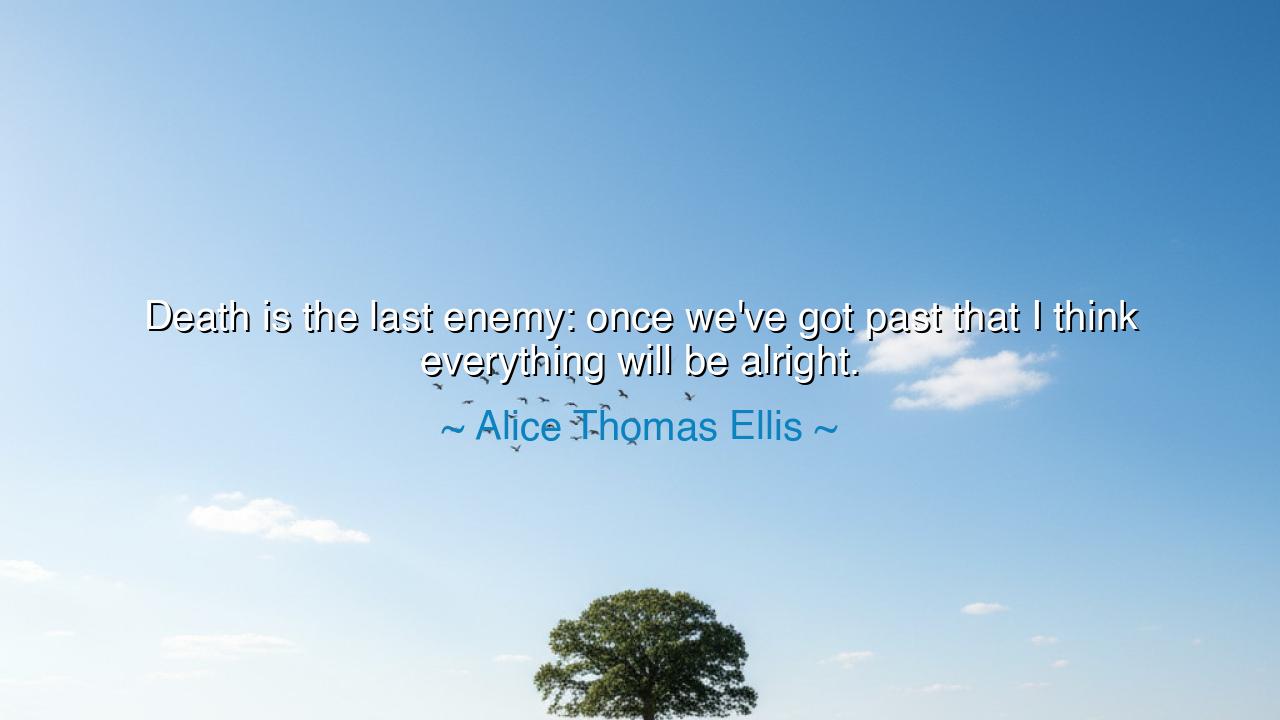
Death is the last enemy: once we've got past that I think






The British writer Alice Thomas Ellis, whose pen blended irony, faith, and fierce wisdom, once wrote: “Death is the last enemy: once we’ve got past that I think everything will be alright.” In these few words, she confronts the oldest shadow that has ever followed humankind—the fear of death—and transforms it into something almost gentle, even hopeful. Her words echo the ancient scriptures that called death “the last enemy to be destroyed,” yet she speaks them not as a preacher but as a woman who has looked upon loss, sorrow, and mortality and found within them a strange peace. It is not defiance that breathes through her words, but a deep knowing: that once we reconcile ourselves with death, nothing else in life can truly conquer us.
In this reflection, Ellis invites us to see death not as a terror, but as a threshold. For what is an “enemy,” if not that which teaches us courage? She reminds us that every other battle—pain, poverty, heartbreak, fear—are but rehearsals for this final meeting. All our struggles are small mirrors of the last one. Once we have faced the greatest of them with acceptance and grace, we will discover that the lesser fears lose their sting. “Everything will be alright,” she says—not because life becomes easy, but because once death loses its power over us, life itself becomes lighter, more sacred, more deeply loved.
The origin of this idea reaches back into the spiritual traditions that shaped both Ellis and the ages before her. In the Christian scriptures, the Apostle Paul wrote, “The last enemy that shall be destroyed is death.” But Ellis, with her characteristic wit and depth, transforms this theological promise into a personal meditation. She does not speak of divine triumph alone, but of human acceptance—the inner victory over fear that allows one to live fully, even amid mortality. In her view, the problem is not death itself, but our refusal to make peace with it. For she knew that the moment we stop trembling before the inevitable, we begin to live without walls, embracing each day as both fragile and eternal.
History gives us noble examples of souls who have lived this truth. Consider Socrates, condemned to drink the hemlock. When his students wept, he smiled and said that death was merely the release of the soul from the body, and that a true philosopher spends his life preparing for that moment. He drank the cup calmly, speaking to his friends until his breath was gone. Socrates had long since made peace with death, and in doing so, he made peace with life. His serenity did not deny mortality—it transcended it. And so, in the same spirit, Ellis speaks not of denial or bravado, but of clarity: when we understand that death cannot be escaped, we are free to meet it without dread and to live without despair.
But Ellis’s wisdom also bears tenderness, born of personal loss. She was no stranger to grief—she lost a child, endured illness, and wrestled with faith. Her understanding of death was not abstract; it was carved by experience. Thus, when she speaks of death as “the last enemy,” she does not mock sorrow—she sanctifies it. For her, to “get past” death was not to dismiss it, but to walk through it with hope intact. She believed that what lies beyond may not be darkness, but peace—that the great mystery which frightens us may in truth be a homecoming. Her words, then, are both a balm and a challenge: a call to meet our final hour not with fear, but with quiet trust.
In every age, men have tried to build walls against death—monuments, medicines, empires—but death, as Ellis gently reminds us, waits patiently beyond them all. And yet, she does not see this as a cruelty. It is death’s certainty that gives weight to love, meaning to kindness, urgency to beauty. When we live as if time were endless, we grow careless; when we remember that all things must pass, we love more fiercely, forgive more quickly, and awaken to the miracle of existence. Death, then, though an enemy, becomes the final teacher—showing us what truly matters before we depart.
So, my child, take this lesson to heart: do not waste your days hiding from the thought of death. Instead, learn to make peace with it. Sit quietly sometimes and imagine the stillness beyond the veil—not with fear, but with reverence. Let it remind you that you are alive now, breathing, feeling, capable of love and wonder. When you embrace this truth, every sunrise becomes a gift, every moment a chance to live beautifully. And when the end finally comes, you will not be a stranger to it—you will walk calmly into its arms, knowing, as Alice Thomas Ellis promised, that once we have faced death, everything will indeed be alright.
For death, though it ends the body, cannot end the spirit that has learned how to live. And those who understand this do not merely survive—they rise, even while they yet walk the earth.






AAdministratorAdministrator
Welcome, honored guests. Please leave a comment, we will respond soon